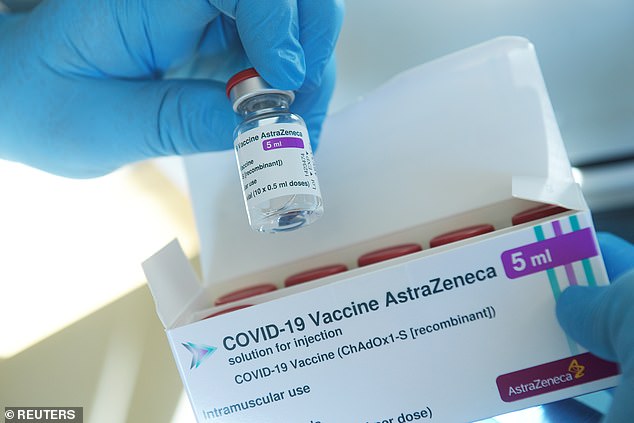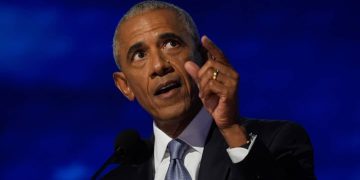Austria has suspended vaccinations with a batch of AstraZeneca’s coronavirus jabs as a precaution following the death of one person and the illness of another after the shots.
A 49-year-old woman died as a result of severe coagulation disorders, while another 35-year-old woman developed a pulmonary embolism, an acute lung disease caused by a dislodged blood clot, and is recovering, the Federal Office for Safety in Health Care (BASG) said.
The agency confirmed it had received two reports ‘in a temporal connection’ with a vaccine from the same batch in the district clinic of Zwettl, Lower Austria.
‘Currently there is no evidence of a causal relationship with the vaccination,’ BASG said.
Swiss newspaper Niederoesterreichische Nachrichten as well as broadcaster ORF and the APA news agency reported that the women were both nurses who worked at the Zwettl clinic.
BASG said blood clotting was not among the known side effects of the vaccine and confirmed it was pursuing its investigation vigorously to completely rule out any possible link.
‘As a precautionary measure, the remaining stocks of the affected vaccine batch are no longer being issued or vaccinated,’ it added.
AstraZeneca has been approached for comment. It is not clear which factory the batch of vaccines came from.
The APA news agency quoted AstraZeneca as saying the company was in contact with Austrian authorities and would fully support the investigation.
It noted the vaccine had been approved by the European Medicines Agency and the World Health Organization based on a global clinical program involving 23,000 participants.
‘All of these evaluations have concluded that the AstraZeneca COVID-19 vaccine is safe and effective,’ the company said.
European Union regulators on Jan. 30 approved the product, saying it was effective and safe to use.
Adverse reactions seen in trials were short-lived for the most part and blood clotting issues were not reported.
The suspension comes amid the EU’s ongoing row with AstraZeneca following Covid vaccine bungling.
In January, AstraZeneca slashed its first-quarter supplies to the EU from 90 million to 40 million doses.
The company later told the EU it was also likely to miss its target for the second quarter by 50 per cent.
The fallout prompted Brussels to institute an ‘export transparency mechanism’, which forces vaccine manufacturers to ask for permission from national governments before they can ship supplies outside of the EU.
Despite Eurocrats initially insisting the mechanism would not be used to block vaccine shipments, last Thursday Italy halted the export of 250,000 Oxford/AstraZeneca jabs destined for Australia.
French health minister Olivier Veran suggested on Friday that France ‘could do the same’.
But the move sparked a diplomatic crisis, with officials in Canberra branding the EU ‘desperate’ and accusing it of trying to ‘tear up the rule book’.
Boris Johnson’s spokesman added: ‘We would expect the EU to continue to stand by its commitments.’
In the latest turn of events, the EU is now set to ask the US for millions of Covid vaccines as it tries to plug the shortfall in its programme.
Former Tory leader Sir Iain Duncan Smith said the EU was ‘desperately scrabbling around to grab hold of anything they can get their hands on’.
‘This vaccine debacle exposes what the EU is all about,’ he said last night. ‘It’s an insular, protectionist organisation that actually believes it is the most important place on earth.
‘They simply cannot accept that they have screwed up. First of all, they blame the British. Then they accuse Australia. Now they are going cap in hand to America and essentially saying, “You’ve got spare vaccines, give them to us.” It’s absolutely pathetic.’
The EU’s demands for the Oxford jab also come after France and Germany were forced into embarrassing U-turns, having initially questioned its effectiveness for the over-65s.
French President Emmanuel Macron had sparked fury when he suggested the vaccine was only ‘quasi-effective’ in older people.
French Prime Minister Jean Castex admitted last week that the jab was ‘very efficient’ and worked as well as other EU-approved vaccines.
German health minister Jens Spahn also admitted that the vaccine works ‘very well’ in the over-65s.
The UK has administered 21.7 million first doses and over a million second doses – equivalent to more than a third of the population.
By comparison, across all EU states, just 8.4 per cent of citizens have had an inoculation.
Source/Author: DAILY MAIL













